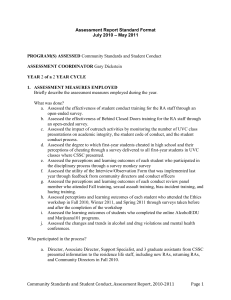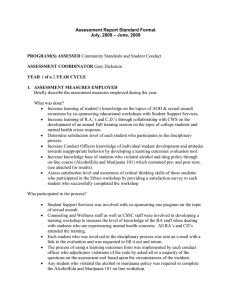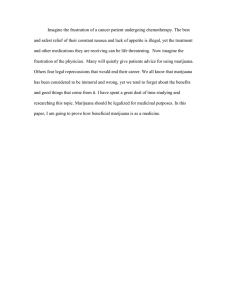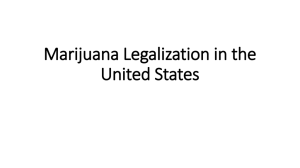Community Standards Student Conduct
advertisement
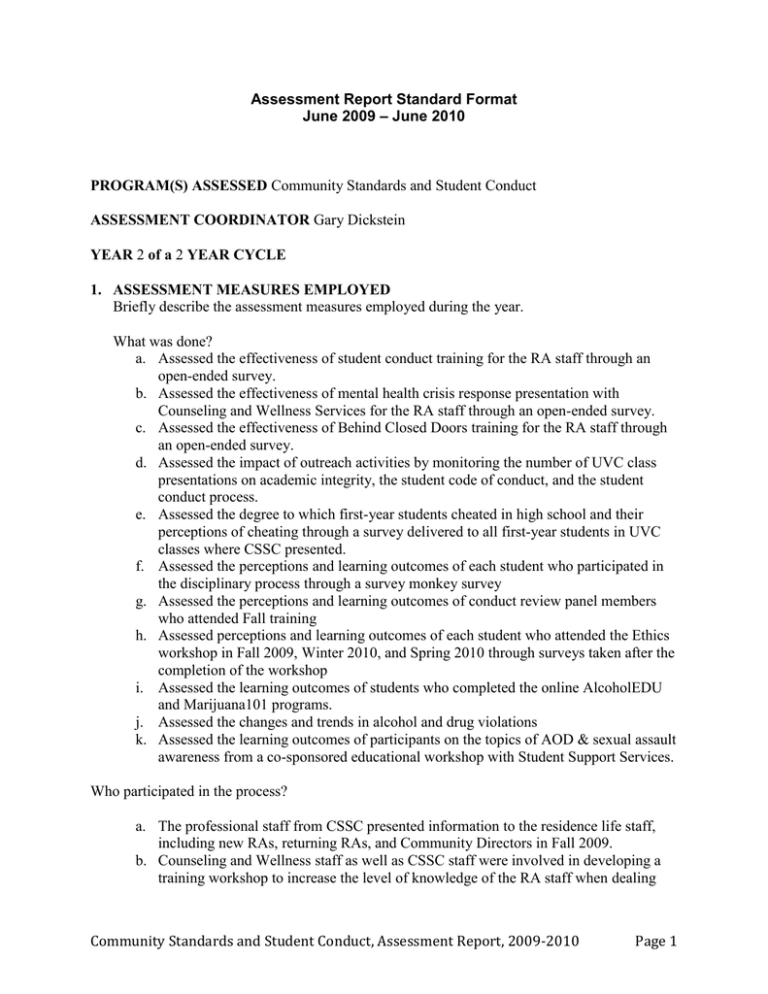
Assessment Report Standard Format June 2009 – June 2010 PROGRAM(S) ASSESSED Community Standards and Student Conduct ASSESSMENT COORDINATOR Gary Dickstein YEAR 2 of a 2 YEAR CYCLE 1. ASSESSMENT MEASURES EMPLOYED Briefly describe the assessment measures employed during the year. What was done? a. Assessed the effectiveness of student conduct training for the RA staff through an open-ended survey. b. Assessed the effectiveness of mental health crisis response presentation with Counseling and Wellness Services for the RA staff through an open-ended survey. c. Assessed the effectiveness of Behind Closed Doors training for the RA staff through an open-ended survey. d. Assessed the impact of outreach activities by monitoring the number of UVC class presentations on academic integrity, the student code of conduct, and the student conduct process. e. Assessed the degree to which first-year students cheated in high school and their perceptions of cheating through a survey delivered to all first-year students in UVC classes where CSSC presented. f. Assessed the perceptions and learning outcomes of each student who participated in the disciplinary process through a survey monkey survey g. Assessed the perceptions and learning outcomes of conduct review panel members who attended Fall training h. Assessed perceptions and learning outcomes of each student who attended the Ethics workshop in Fall 2009, Winter 2010, and Spring 2010 through surveys taken after the completion of the workshop i. Assessed the learning outcomes of students who completed the online AlcoholEDU and Marijuana101 programs. j. Assessed the changes and trends in alcohol and drug violations k. Assessed the learning outcomes of participants on the topics of AOD & sexual assault awareness from a co-sponsored educational workshop with Student Support Services. Who participated in the process? a. The professional staff from CSSC presented information to the residence life staff, including new RAs, returning RAs, and Community Directors in Fall 2009. b. Counseling and Wellness staff as well as CSSC staff were involved in developing a training workshop to increase the level of knowledge of the RA staff when dealing Community Standards and Student Conduct, Assessment Report, 2009-2010 Page 1 c. d. e. f. g. h. i. j. k. with students who are experiencing mental health concerns. All RA’s and CD’s attended the training. Associate Director of CSSC co-coordinates Behind Closed Doors training. In Fall 2009, the Director, Associate Director, and 2 graduate assistants from CSSC participated in BCD to provide support on documenting situations, policy, and proper reporting to new and returning RAs. Director, Associate Director, and 2 graduate assistants presented information about CSSC to UVC courses in Fall 2009. All students in UVC classes that were visited by CSSC staff completed a survey on their high school cheating experiences. Each student who was involved in the student conduct process was sent an e-mail with a link to the evaluation and was requested to complete it. All new conduct review panel members were invited to attend trainings. Those who attended were given the opportunity to give feedback on trainings through evaluation surveys. Every student who was sanctioned to the ethics workshop and who attended all sessions was given the opportunity to complete a course survey on the final class meeting. Most students who violated the alcohol or marijuana policy were required to complete the AlcoholEdu or Marijuana 101 on line workshop. All conduct officers adjudicate cases of alcohol and drug violations. Student Support Services was involved with co-sponsoring one program on the topic of sexual assault. 2. ASSESSMENT FINDINGS a. RA Training CSSC staff presented information on policy, the conduct process, documentation, and incident reporting with the new online database. While many RAs indicated that the presentations were long and redundant, the vast majority of respondents indicated that the presentations were very informational, important, and helpful in understanding policies and procedures. b. Mental Health Training A half day training session on student suicide and mental health crisis’s was developed and presented with Counseling and Wellness where all ORS paraprofessional and Hall Director staff attended (approximately 85 people) A survey was provided to each participant. The results provided us with feedback that was generally positive and showed that the participants learned information about the topic they did not know before. The feedback also indicated that changes to the program for the following year should include modifying the delivery method of the information and the length of the program. c. Behind Closed Doors Training CSSC staff participated in the BCD training by attending the skit presentations. CSSC staff served to answer questions about policy and procedure in handling Community Standards and Student Conduct, Assessment Report, 2009-2010 Page 2 situations in the residence halls. A survey was provided to all RAs. Feedback from both new and returning RAs indicated that BCD was informative, fun and good practice. They also indicated that there was too much time in between the short scenarios. d. UVC Presentations CSSC staff members presented information on academic integrity, the code of student conduct, and the student conduct process to 11 UVC classes in Fall 2009, compared to 14 in Fall 2008, a slight decrease. We made contact with 204 students in 2009 compared to 229 students in 2008, a slight decrease. e. UVC Academic Integrity Information Surveys were administered to every student in the UVC classes who invited CSSC staff to present. 168 out of 204 students (82%) indicated that they cheated in high school at least one time, compared to 189 out of 229 students (83%) from Fall 2008. Information was also gathered on the number of times cheated (one, two, three, or more than three times)/ f. Conduct Process Survey 64 students completed the discipline process evaluation on survey monkey after going through the student conduct process between September 2009 and September 2010. 46 respondents were first-time offenders going through the conduct process while 8 respondents were second-time or multiple-time offenders. Alcohol played a role in slightly more than half of these cases. 80% of all conduct conferences were reported to have taken between 15 and 30 minutes each. 35% of these cases were adjudicated by the Director or Associate Director, 64% were adjudicated by Residence Life staff and graduate assistants, and 3% were adjudicated by a hearing panel. 1. 59 students indicated they felt that an opportunity was provided to them to tell “their” side of the story, compared to 2 who didn’t. 2. 53 students indicated their side of the story regarding the incident was listened to by the conduct officer, compared to 8 who didn’t. 3. 35 students indicated they believed the sanction(s) they received as a result of their conduct conference were appropriate, compared to 16 students who indicated that the sanctions were not appropriate. 4. 41 students indicated they believed the incident and consequences caused them to think more about how my behavior affected themselves or others, compared to 10 who didn’t. 5. 40 students indicated the incident and its consequences have caused me to think more about how my behavior has affected them, compared to 11 who didn’t. 6. 43 students indicated they believed as a result of the incident and consequences that they would be less likely to repeat the behavior in the future, compared to 8 who didn’t. Community Standards and Student Conduct, Assessment Report, 2009-2010 Page 3 7. 45 students indicated they were notified of their right to appeal during the meeting with the conduct officer, compared to 6 who didn’t. 8. 48 students reported being treated with courtesy and respect during the conduct meeting, compared to 6 who didn’t. g. Conduct Review Panel Training Evaluations New Conduct Review Panel Members were trained in the Fall. Panelists who attended the training completed evaluations on perceptions and learning outcomes of the trainings. Sixteen new panel members attended Fall training. Panelists indicated that their favorite part of training was the mock hearings and that their least favorite part of training was reading material from the training binders. Overall, they also indicated that it would be reasonable to ask participants to read the materials prior to training en-lieu of reading so much of it at training. Additional comments and suggestions regarded the food provided and the length of presentations. h. Ethics Workshop Evaluations The findings from the ethics workshop evaluations were very positive. The majority of participants felt the workshop to be helpful and made them aware of the ethical dilemmas of their inappropriate behavior. The participants thought the workshop increased their ability to critically make decisions in the future to avoid further negative consequences. The participants also shared that the course could be lengthened to further expand on the principles and concepts addressed in the sessions. i. AlcoholEDU and Marijuana101 Most students who are found responsible of alcohol or drug violations are required to take an online course, either AlcoholEDU or Marijuana101. Students must pass a test and complete a follow-up survey to complete the course. Alcohol EDU Workshop At the time of data collection in December 2009, 137 Wright State University students participated in AlcoholEdu for Sanctions (i.e. completed Survey 1 or the Pre-Test, at minimum). Seventy-four percent (74%) of students who participated in the AlcoholEdu surveys (ages 18 and over) completed the entire course, including all three surveys. Data from the Alcohol EDU survey indicates the following: Behavior Change Wright State University students reported an increase in their expressions of social concern through care-taking behaviors. Overall, Wright State University students reported an increase in the use of protective factors after completing the course. Most notably, the percentage of students who reported they think about their BAC while drinking increased substantially from 40% to 66%. Community Standards and Student Conduct, Assessment Report, 2009-2010 Page 4 Students’ Experience with AlcoholEdu Ninety (90%) of your students reported that AlcoholEdu prepared them to help in situations where they have identified an alcohol overdose. Eighty-nine (89%) of your students considered that AlcoholEdu prepared them to express concern to someone about their alcohol use. Eighty-seven percent (87%) of your students said they paid attention to the course. Seventy-seven (77%) would recommend AlcoholEdu to other people. Marijuana 101 Marijuana 101 statistics were collected between June 1, 2008 and April 1 2010 for the 2009-2010 year. In total, 22 students enrolled in and completed Marijuana 101. Data from the Marijuana 101 survey indicates the following: Knowledge Changes 28% improvement in your students’ Post Test scores compared to Pre Test scores. This demonstrates increased student knowledge about marijuana and behavioral and health issues related to its use. Overall, students had a 24% improvement in scores from Pre Test to Post Test. Attitude Changes Positive change in opinions about the adverse effects of regular marijuana usage on academic and career success Positive change in response to: How important is making a change in marijuana usage? Positive change in incidents students later regretted Behavior Changes Usage Profile 78% decrease in the number of hours spent weekly under the influence of marijuana 73% decrease in dollars spent weekly on marijuana Consequences of marijuana use Positive change in missed classes/work as a consequence of marijuana use No change in incidences of causing physical injury to self or others Positive change in incidents students regretted later Positive change in reporting decreased motivation to learn new things j. Drug and Alcohol Incidents The following table presents a comparison of case data by quarter for the 20082009 academic year and the 2009-2010 academic year. Community Standards and Student Conduct, Assessment Report, 2009-2010 Page 5 Violation Type Alcohol Drug Fall 2009 46 26 Fall 2008 83 24 Winter 2010 61 20 Winter 2009 64 23 Spring 2010 49 20 Spring 2009 19 5 Total 09-10 156 66 Total 08-09 166 52 Case data demonstrates that there was a sharp decrease in alcohol violations in Fall 2009 but a sharp increase in Spring 2010. There was also an increase in drug violations in the Spring 2010. The possible causes of those increases are not yet known. k. Sexual Assault Program A program with Student Support Services on Men Stopping Rape was completed on the topic of sexual assault awareness. Approximately 100 students attended. No formal evaluation of the program was given to participants, however, the comments from the participants was very positive. An alcohol education program was not co-sponsored by CSSC this year. 3. List the LEARNING OUTCOMES of the program. Resident assistants will have an increased knowledge of the student conduct process, appropriate documentation procedures, mental health crises response procedures and using the new online database from attending RA training and Behind Closed Doors training. UVC students will have an understanding of how to access the student code of conduct via out website, the basic principles and procedures of the student conduct process, and in particular, a better understanding of what constitutes violations of academic integrity policies. Each student who is required to go through the student conduct process has a better understanding of student code policies, how their actions affected themselves and others, and are less likely to repeat the behavior in the future. Each Conduct Review Panelist who attended any of the CRP trainings are prepared to hear cases of code violations, including interpreting incident reports and other relevant documents, the hearing process, appropriate questioning techniques, decision-making, and sanctions development. Each student who completes the Ethics workshop will have a better understanding ethical decision making, the student conduct process, and campus resources. Each student who is required to complete the Alcohol Edu. or Marijuana 101 class will achieve a passing score of at least 80% on the required post test to insure retention of knowledge contained in the workshop chapters, and therefore, will have an increased level of knowledge regarding any future use of both substances. Each student who participated in the sexual assault and AOD workshop will have a better understanding and awareness of those topics. 3. PROGRAM IMPROVEMENTS Alter some of the questions in the conduct process survey to obtain more detailed information from the participants about their perceptions of the process. Community Standards and Student Conduct, Assessment Report, 2009-2010 Page 6 Continue making changes to the ethics workshop curriculum. Perform more detailed and intrinsic assessment on case numbers to determine possible causes for increases and decreases in violations over the past year(s). Increase the number of sessions from 4 to 6 for each Ethics seminar offered. Collaborate with Student Support Services in order to continue to provide educational programming for students. Utilize evaluation information to reformat presentation for RA’s on mental health. 4. ASSESSMENT PLAN COMPLIANCE Explain deviations from the plan (if any). None 5. NEW ASSESSMENT DEVELOPMENTS Implementation of a new data-base will be able to produce additional, as well as more accurate, statistical reports to assess who is violating the code, how they are violating it, as well as how many times and the location of the violation. Community Standards and Student Conduct, Assessment Report, 2009-2010 Page 7
